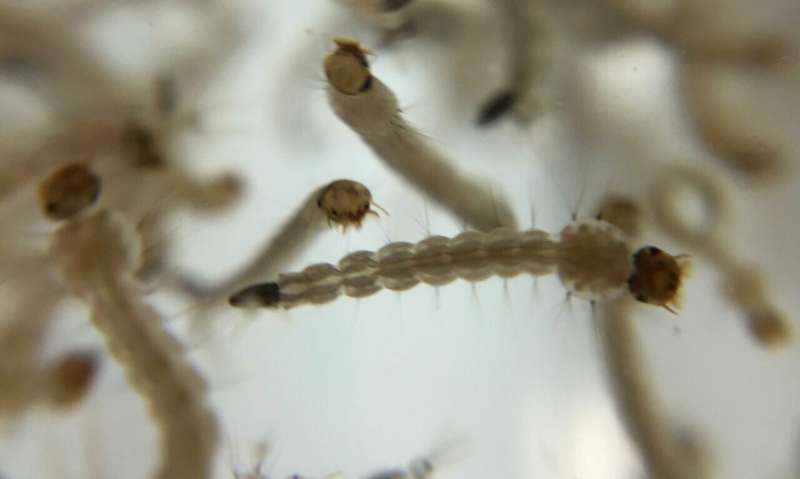Mosquitos learn to avoid pesticides after single non-lethal exposure

Female mosquitoes learn to avoid pesticides after a single exposure, according to a study published in Scientific Reports. The authors suggest that this could make pesticides less effective against mosquitoes.
Pesticides are used to limit the spread of mosquito-transmitted diseases. Pesticide resistance has increased among mosquitoes in recent decades, however the extent to which this is due to mosquito behavior has been unclear.
Frederic Tripet and colleagues exposed female Aedes aegypti and Culex quinquefasciastus mosquitoes—which transmit dengue, Zika and West Nile fever—to non-lethal doses of the common anti-mosquito pesticides malathion, propoxur, deltamethrin, permethrin and lambda-cyhalothrin. They then tested whether subsequent exposure to the same pesticide deterred mosquitoes from feeding and resting, and assessed whether this affected mosquito survival.
The researchers found that mosquitoes that had been pre-exposed to a pesticide avoided passing through a pesticide-treated net in order to reach a food source at a higher rate than those who had not been pre-exposed. Only 15.4% of A. aegypti and 12.1% of C. quinquefasciastus that had been pre-exposed passed through the net in order to feed, compared to 57.7% of A. aegypti and 54.4% of C. quinquefasciastus that had not been pre-exposed. Subsequently, the survival rate of pre-exposed mosquitoes was more than double that of mosquitoes that had not been pre-exposed. 38.3% of A. aegypti and 32.1% of C. quinquefasciastus that had been pre-exposed and 11.5% of A. aegypti and 12.9% C. quinquefasciastus that had not been pre-exposed survived exposure to the pesticide-treated net.
The researchers also found that pre-exposed mosquitoes were more likely than mosquitoes that had not been pre-exposed to a pesticide to rest in a container that smelt of a control substance, rather than in a container that smelt of a pesticide. 75.7% of A. aegypti and 83.1% of C. quinquefasciastus that had been pre-exposed to a pesticide rested in the pesticide-free container, compared to 50.2% of A. aegypti and 50.4% of C. quinquefasciastus that had not been pre-exposed.
The findings suggest that mosquitoes that have been exposed to non-lethal doses of pesticides learn to avoid these pesticides and, as a result, may seek out safer food sources and resting sites, allowing them to survive to reproduce.
More information: Frederic Tripet, Standardised bioassays reveal that mosquitoes learn to avoid compounds used in chemical vector control after a single sub-lethal exposure, Scientific Reports (2022). DOI: 10.1038/s41598-022-05754-2. www.nature.com/articles/s41598-022-05754-2
Journal information: Scientific Reports
Provided by Nature Publishing Group




















